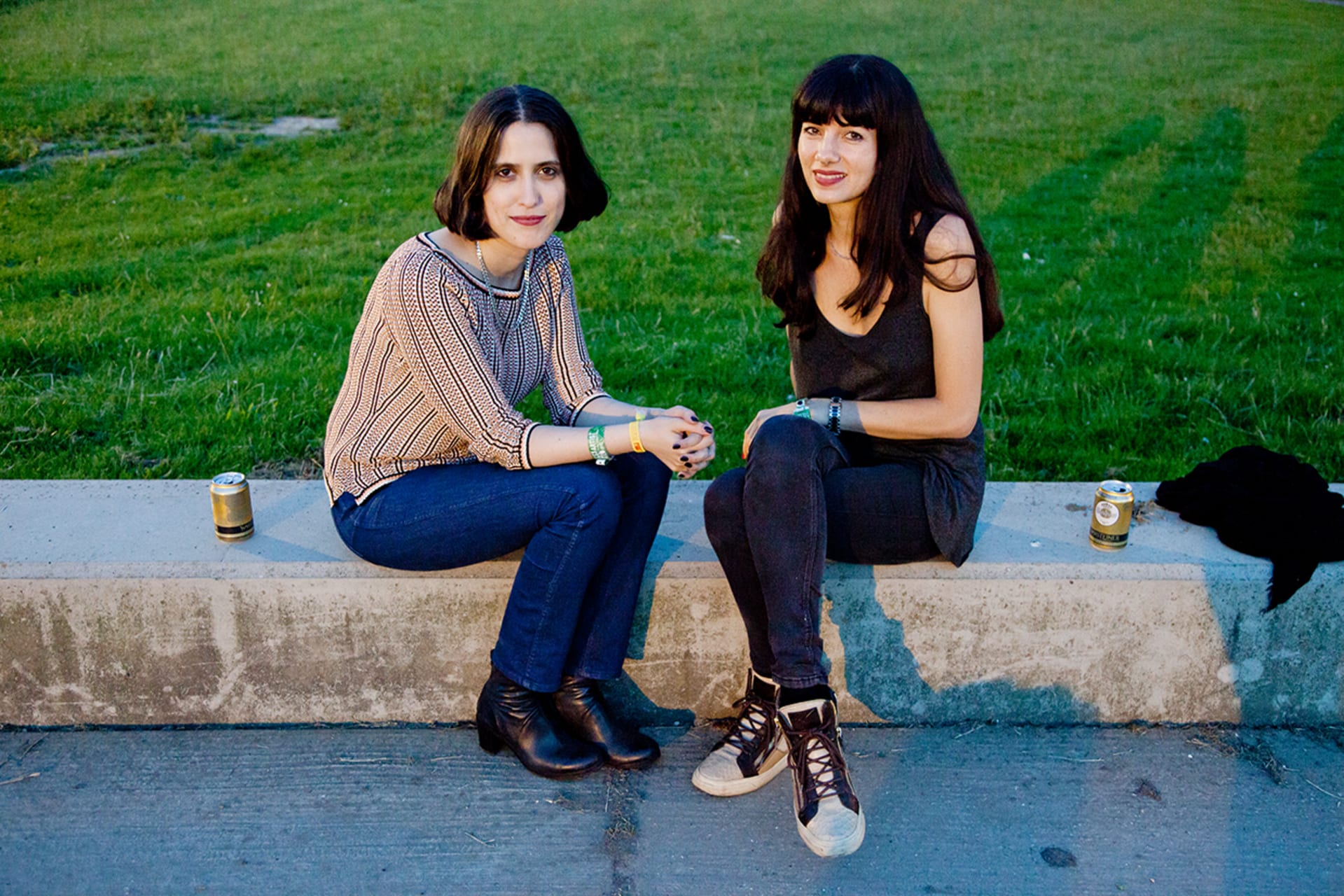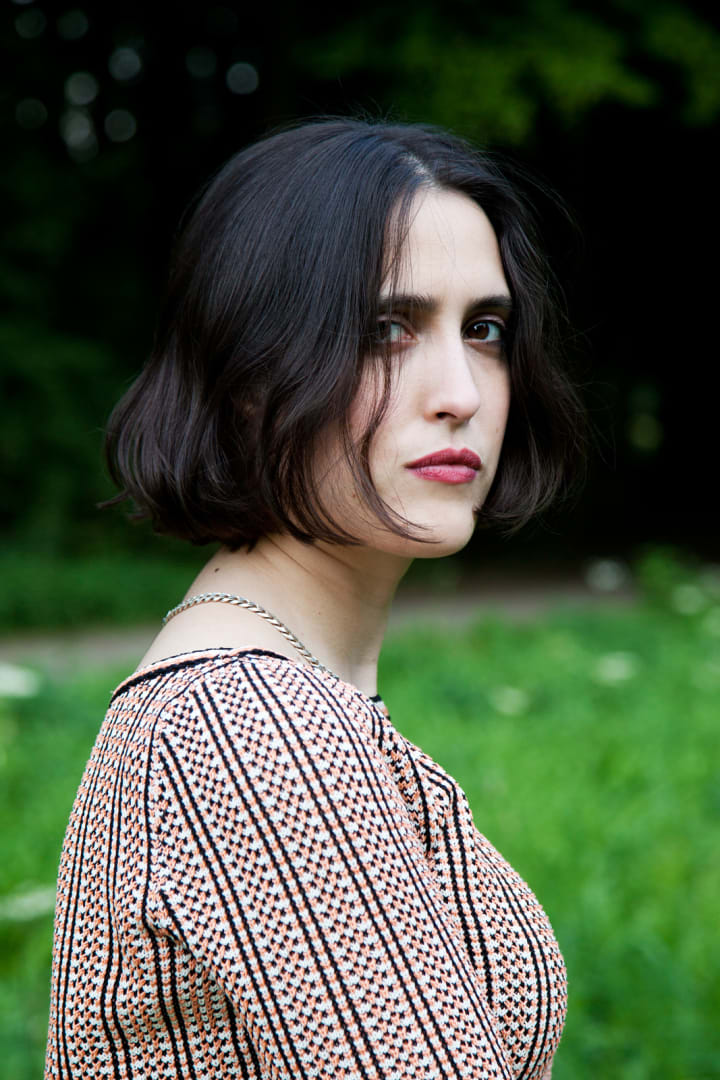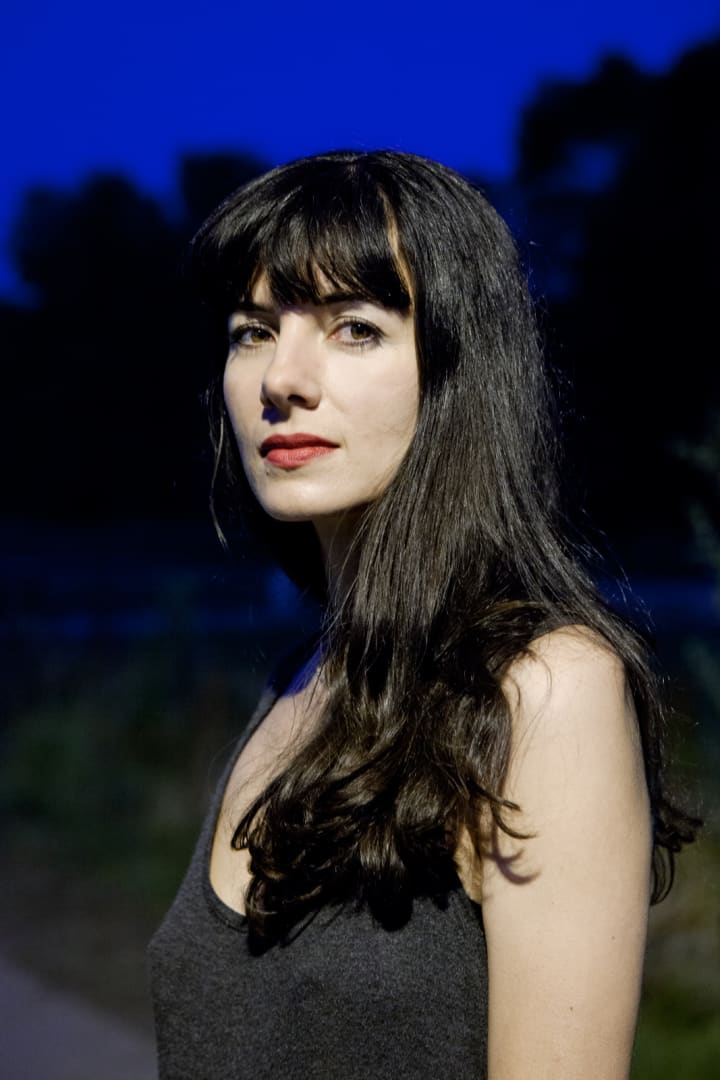
Return To Wave: Helena Hauff Talks To Veronica Vasicka
When techno stumbled out of its obsession with minimal in the mid-2000s, it turned to the leathered arms of EBM, industrial and synthwave for fresh inspiration. The surge of interest in fringe and proto-techno sounds has likely bolstered clubgoers’ increasing infatuation with DJs Helena Hauff and Veronica Vasicka, which reached new heights this year as they amped up their global touring schedules. Yet while 2015 felt like a banner year for them both, neither could be considered a newcomer. In 2003 Vasicka co-founded the now-defunct online radio station East Village Radio in her hometown, New York City, and expanded her Minimal Wave show to include an influential record label dedicated to uncovering rare EBM and synth records from the 1980s. It’s the kind of music you’re likely to hear in one of Hauff’s DJ sets, which are in even higher demand following the release of her acidic first LP, Discreet Desires, on Actress‘s Werkdiscs imprint. The Hamburg native also recently launched her own label, Return To Disorder, and given recurrent rumors that Vasicka’s own solo productions may soon be publicly released, we figured the time was right to unite the two likeminded musicians to share notes on their experiences in the industry.
VERONICA VASICKA: Helena, I think you’re a fantastic DJ. I saw you play at the London show that we did about a year and a half ago. I didn’t really know much about you, and then someone from Hamburg had told me that you’re a resident at the [Hamburg club Golden] Pudel, which was one of my favorite places to play when I first started DJing in Europe. I thought it was really cool that that was where you developed, learned and had your [Birds and Other Instruments residency] nights.
HELENA HAUFF: Pudel’s the first place I saw you DJ. Musically, I just love Minimal Wave. I’m into that kind of dark-ish stuff. I play a lot of Minimal Wave records.
VV: It’s cool that you’re playing this stuff and also creating your own music that can be mixed with it. It brings the past into the present.
HH: I don’t really care if it’s from the ‘80s or if it’s from today; I just like a certain sound. That’s what I like about Minimal Wave as well: you release different kinds of music from different times, and it doesn’t really matter when it’s from. I like the aesthetic.
VV: The sound of Minimal Wave and the way you DJ are both very immediate, raw and rough.
HH: Definitely. I saw a few photos of you with synthesizers in the background, so I wanted to ask you—I know that you’ve produced some music as well, and I was just curious to know if you put things out under another name or something?
VV: No, but a lot of people have asked about that recently. I used to record pretty much every day. It was like a diary; I would just leave the machines on and record. I have years of music that needs to be edited. I’ve done collaborative stuff, but it’s not as daring. My own style is a little more experimental, but very rhythmic. When I was 18 I got a drum set, and I used the Casio SK-1 to sample the snare drum to make tapes of drum sounds. I remember playing it for somebody around 1996, and they were like, “You know, this is like jungle.” I was like, “What’s jungle?” I didn’t really know what I was doing. A lot of the time, I just record and put it away. It’s more of a process than it is about making music for the masses and releasing it.
HH: I know what you mean. When I record music, I don’t really think about releases—I just make music. Most of it actually got released, but I never thought about that. I started producing like six or seven years ago on Cubase, and I actually got really frustrated. I didn’t like to sit in front of the computer screen, so I stopped. Then I got into DJing and really enjoyed it, so I thought, “I have to find a way to make music.” So I started to collect synthesizers.

VV: You’ve come a long way in a short amount of time. I started recording when I was 17. I had a bass guitar and I would tape record interesting sounds outside or industrial sounds. Then I would bring the tape recorder to the pickups on the bass guitar, and the sounds of the tapes would come through and I would record those on a four-track. It really was just about exploring sound and not thinking of an end product. When I was 11 and my brother was 13, I started listening to his tapes of the Cure, the Smiths and New Order. I ended up going much deeper very quickly into darker electronic stuff. I definitely didn’t fit in in high school, but I didn’t care at all. People commented and stared at me on the street because I was pretty extreme in the way I looked. In our yearbook, there were slogans that said “Eighth grade wouldn’t be the same if…” and mine said, “Eighth grade wouldn’t be the same if Veronica wore white.” But none of it phased me. I just felt like, “All these people are idiots.” I had my own little music world, and that was all I cared about at the time. I felt like, “I know something you don’t know. This is my own secret world of music.”
HH: I had a time as a teenager when I really tried to fit in, so I looked like everyone else, but I wasn’t like everyone else and it didn’t work. I never got bullied at school, but I never had a lot of friends, either. I wasn’t into crazy weird music at the time. I was into the Cure and Joy Division—pretty mainstream-ish music, but none of the kids at my school knew about it. Looking back, I think I was cooler than all the other kids, but I didn’t feel that way when I was young. I loved music and I loved sitting at home and recording stuff onto cassette and listening back to it. But I didn’t have anyone to share that interest with. When I left school I realized, “Oh, there are actually other people that are into music, and my taste of music is actually not that weird. It’s pretty normal.”
VV: Those formative years are interesting to think about because you’re a sponge at that time. I got a little too into collecting synthesizers around the beginning of Minimal Wave—I started a radio show in 2003 and the label in 2005—and I was really curious about the instruments that they used in all these tapes. I was obsessed with certain drum machines. I would listen to a tape and say, “OK they used a CR-78 in this tape.” I started recognizing what instrument was used.
HH: How did you find out about what they used on the recordings on the old tapes?
VV: I would write to [the creators]. But I think it was that, as soon as I started recognizing the sounds of the machines, it became second nature. Over time, I would listen to songs I had known for such a long time, like “Just Fascination” by Cabaret Voltaire, and I would say, “That’s a Juno 60, that weird synth line.” And then I thought, “OK, I need this machine. I want to make music.” The synths weren’t as expensive as they are today.
HH: I was going to say that you were pretty lucky to start around that time because drum machines weren’t as sought-after as they are now.
VV: They weren’t in high demand. Now a lot of companies are recreating those old synths, or different versions of them. It’s very in vogue to have gear and not to use a computer, which I think is great.
HH: When you start making music, it’s actually easier to have limitations the way you do with machines.
VV: Exactly. You have a limited vocabulary, so you can make something more easily. But I use a computer now to DJ, so I feel like I’ve come full circle. The computer is a great tool because you can take samples from old tracks, like some song from 1981 where 30 seconds is good and the rest is terrible. You bring that into a set and just use parts of it to loop stuff and create something new by combining the old and new.
HH: I totally agree. But I’m not a computer-type person—they just confuse me. To be fair, my computer is really old and it doesn’t really work. I don’t want a new computer; I’d rather spend money on a synthesizer. But maybe if I had a new, fully-working computer I’d get into it.
VV: What’s happening with your label?
HH: Everything is fine now, but at first it went wrong. My idea was to work with an independent pressing plant and do everything on my own. The pressing plant actually sent me 100 copies of the record at the wrong speed, so you had to pitch it down to minus 8 to make them play right. It wasn’t techno; it was a band with vocals, and the guy on it sounded like a girl. The pressing plant said, “We’re going to sort it out. We’re very sorry, it’s our mistake.” But I never heard back from them. They either went bust, or…I don’t know.
VV: That’s crazy. I think that’s just a stroke of bad luck.

HH: Yeah. When I first started, I was like, “How do you start a label? What do you have to do?” It was such a strange feeling. I kind of knew what you had to do, and I had a few friends who had labels, so I was like, “OK I need a pressing plant, a distributor…how do you do it?” It was so confusing. What was it like for you to start your label? Did it feel like a natural thing? Was it easy or were you confused at the beginning?
VV: I think it was pretty natural. But it was more about the radio show, in a way. I was the program director at East Village Radio, and I was in the office above the radio station all the time. When I played [the first Minimal Wave release] Oppenheimer Analysis on the radio and when I was DJing in a bar, people got so excited about it. For me it was more like, “I need to get this music on vinyl immediately.” I didn’t think too much about the process; I just thought about the end result. The first release took a lot longer than I had expected. At the time, in 2005, I don’t think there was such a huge demand for vinyl. I didn’t wait too long to get the test pressings. The best part was bringing the first 20 copies to Other Music, a record store in New York, and putting them on consignment. They sold right away. It’s probably a lot harder now, to be honest, because I’ve had so many issues with pressing plants recently. This year has been the worst year for pressing plants, because they’re so crowded.
HH: It is. I never thought that the whole process would take so long. It’s ridiculous.
VV: Even a few years ago, it wasn’t like that. There was a guy pressing records in New York City who would give you test presses in like, ten days. That’s unheard of now. Tell me about your label, Helena. I want to know what you’re going to release and what’s the plan?
HH: The plan is: there is no plan. Hold on a sec. [Away from the microphone] Could you stop throwing my fucking plants away? Stop! [Back at the computer] Did you hear that?
VV: Yeah. Was it a dog or a cat?
HH: It’s a 15-year-old cat, and it’s messing up my plants in the garden. It just threw my Japanese mint away. Anyway, my label—I don’t really have a plan. I just want to put up things that I like, basically. The first release is a band called Children of Leir from England. They use a drum machine and a synthesizer, and the rest is guitar and bass. The second release is going to be a guy from Greece called Morah. He produces really interesting techno. As I said about the way I got into music, I don’t really care about genres, and I want my label to be like that. Everything I like is going to end up on it—well, everything available that I like. I don’t know if it’s going to work. Maybe I’ll get frustrated and won’t like having a label and I’m going to stop doing it in a year’s time. Maybe it’s going to be great and I’ll really enjoy it. I just thought, “Yeah, I want to start a label now.” So I did it.
VV: I think it’s better not to have a plan, because it’s really more about what you’re interested in putting out there. That’s ultimately what’s going to drive the label forward.
HH: I’ve got an idea for the third release, and I hope it’s going to work out. It might be a split release with a guy from Croatia and another guy on the flip side. There’s also a band from Belgium that I really like that makes guitar-based music, rock. They’re very pop-y, actually—it’s far away from electronic music. I hope that it’s gonna work. I don’t care if it’s the artist’s first release or if they’re well known or if it’s their tenth release and no one really cares about them. I’m going to put it out, and I don’t really care about everything else.
VV: It’s just about your vision, right? Your taste.
HH: Yeah. It’s just about my taste. The only thing is that I want to work with people I like. I don’t necessarily need to know them in person. It’s great if I do, but if I don’t and their email communication is nice and everything, that’s cool. Obviously, no one wants to work with obnoxious people, so that’s the only rule: if someone’s obnoxious I’m not going to work with them.
VV: Oh yeah. That’s happened too many times. But I tend to be pretty patient, so I think I’m the ideal person to deal with the characters that have been on Minimal Wave. I’ve also been really lucky with a lot of the artists who were very open-minded and easygoing and not so specific about what they envisioned for the end product. Sometimes it’s really hard because you need the artist to trust you as a label so that you can do your own thing with their music. When it’s more about what they want, or what they imagine—when they’re too controlling about it—it becomes a problem. Every step of the way they want to hear another version of the master, they want changes to the artwork, they want a certain image of themselves not to appear on the artwork, so it’s not always ideal. But when they’re easygoing, everything flows smoothly and things get done a lot more quickly. And when an artist is really difficult, their records tend to sell slower than the artists that are easy—not all across the board, but it seems like the ones that are the most demanding are the slower to sell.
HH: I think it’s cool when someone really exactly knows what they want. But if they’re cunts, obviously, it’s a bit shit.
VV: Get to the bottom line of what they require sooner than later, because then you’ll spend a lot of time of emailing back and forth with them, saying, “Well no, I don’t want this, and I don’t want this.” The thing is that, ultimately, I want the artist to be happy. But it’s frustrating to get to a point where all this work has been done and then they change their mind and they say, “I want this bio edited,” and all the text has already been set. Having all the information upfront as to how much control they want is important. But I’m pretty flexible. Anyway, Helena, we should stay in touch. You should send me some of your music though email.
HH: Definitely.
An abridged version of this article originally appeared in the Fall 2015 edition of Electronic Beats Magazine. Click here to read more from past issues. All photos were taken at Dekmantel by Isolde Woudstra.
Published November 24, 2015.
